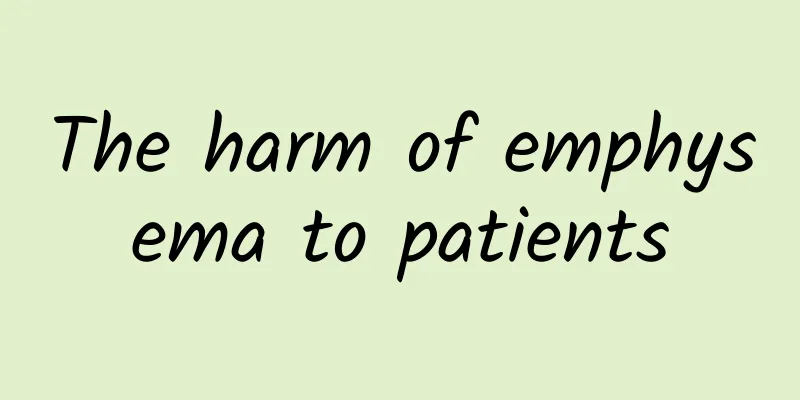The harm of emphysema to patients

|
The lungs are a very important organ in our human body. Once there is a problem with the lungs, it will cause great harm to our body, so we must pay attention to the lungs. Many friends have the habit of smoking. If you want to protect your lungs, it is best not to smoke too much, because smoking is very harmful to the lungs. A common lung disease is emphysema. We should understand the harm of emphysema, so that everyone can pay attention to this disease and take preventive measures against emphysema. So what are the specific harms of emphysema to patients? Emphysema refers to a pathological state in which the airway elasticity at the distal end of the terminal bronchioles is reduced, over-expanded, inflated, and the lung volume increases, or is accompanied by airway wall destruction. According to the cause of the disease, emphysema has the following types: senile emphysema, compensatory emphysema, interstitial emphysema, focal emphysema, paraseptal emphysema, and obstructive emphysema. 1. Harm to other devices In severe cases, the carbon dioxide level in the blood increases, and the lack of oxygen can affect the functions of the heart, brain, kidneys, liver and gastrointestinal tract, resulting in corresponding symptoms. When emphysema is severe, it can lead to cor pulmonale and failure; spontaneous pneumothorax caused by rupture of bullae can lead to large-area lung collapse; respiratory failure, pulmonary encephalopathy and many other problems. 2. Danger to Life Its harmfulness penetrates slowly, and there are usually no obvious symptoms at the beginning. This disease is most easily ignored and is the most dangerous. Once the lungs are damaged and the remaining tissues cannot maintain the body's oxygen supply function, the lungs become disabled and cannot be treated, seriously endangering the patient's life. 3. Harm to the lungs Due to damage to the alveoli and capillaries, the tasks of inhaling oxygen and expelling carbon dioxide cannot be completed, which will cause hypoxia in the human body, so that the lungs will be damaged, and the produced tissues cannot maintain the body's oxygen supply function. At this time, a state of hypoxia will occur, breathing difficulties, and even life-threatening dangers. Above, we introduced the importance of lungs to the human body. We must be careful about lung diseases. A common lung disease is emphysema. Emphysema is very harmful to our body. The above article introduced in detail the three hazards of emphysema. I hope everyone can correctly understand the disease of emphysema and protect their lungs well. |
<<: Home treatments for people with emphysema
Recommend
What causes liver pain?
Liver pain is relatively common in clinical pract...
How to treat ankle cysts
Ganglion cysts of the ankle are relatively common...
What kind of stomach problems can cause diarrhea?
Modern people are under great pressure in life. I...
What causes arm muscle pain?
In fact, muscle pain in the hands and arms is qui...
Can high-level paraplegia have children? Sex life actually depends on it
Patients with high paraplegia are likely to have ...
What is ground-glass opacity in the lungs?
Once nodules appear in the human lungs, ground-gl...
Erosive gastritis
There are many common types of diseases, and diff...
How long does it take for surgical wounds to heal?
Most surgeries will leave certain scars on the pa...
I have a period after confinement for one month.
Pregnant women will not have their periods during...
Can't close mouth when sleeping
People’s daily living habits can affect many thin...
Can I eat after checking my blood type?
Blood type health has always been a concern for m...
The biggest difference between real fire and false fire
"Getting hot" is a very common term in ...
The efficacy and function of Dachuanxiong tablets
Because Dachuanxiong Tablets have the effects of ...
Six ways to nourish your stomach: don’t miss them
The stomach is a particularly important organ in ...
What are the effects and functions of Ophiopogon japonicus
There are always some weeds growing in the fields...









